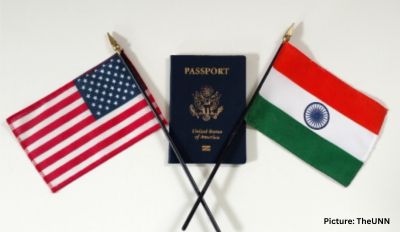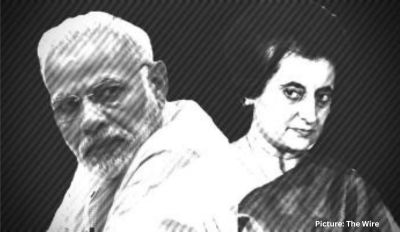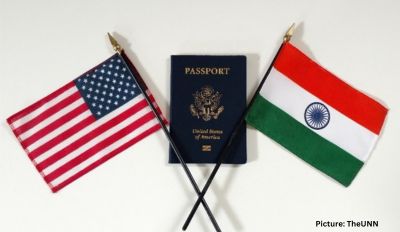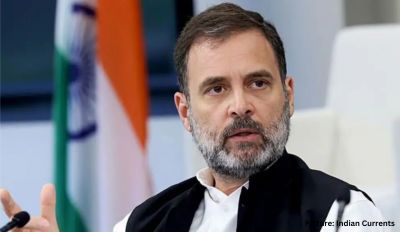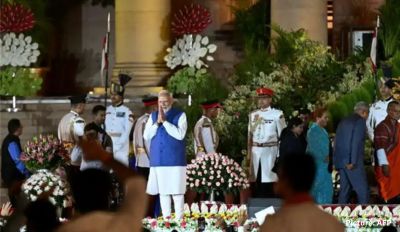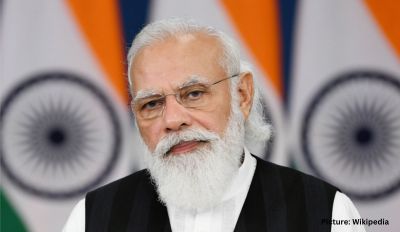India’s external affairs minister S. Jaishankar earlier this week tweeted about his separate meetings with his Australian and French counterparts. That hadn’t been the plan—there was supposed to be a meeting of their trilateral on the U.N. General Assembly sidelines. However, that meeting was an early casualty of the rollout of AUKUS, the new Australia-U.K.-U.S. security partnership, which upset Paris. Although Delhi has not explicitly endorsed or criticized the arrangement, it is on balance likely to be seen positively by India.
 Delhi’s relative silence about AUKUS does not signify a lack of interest. The development involves three of India’s closest partners in the Indo-Pacific (Australia, France, and the U.S.), and a fourth emerging partner in that region (the U.K.). India sees these countries as helpful in preserving a favorable balance of power and rules-based order in the region and globally. And India will see AUKUS and the subsequent family feud through the lens of their effect on these Indian objectives.
Delhi’s relative silence about AUKUS does not signify a lack of interest. The development involves three of India’s closest partners in the Indo-Pacific (Australia, France, and the U.S.), and a fourth emerging partner in that region (the U.K.). India sees these countries as helpful in preserving a favorable balance of power and rules-based order in the region and globally. And India will see AUKUS and the subsequent family feud through the lens of their effect on these Indian objectives.
The Indian strategy to achieve these goals has involved building its capabilities and partnerships, encouraging the U.S. to remain engaged in the region, welcoming the efforts of like-minded Indo-Pacific and European partners, and building coalitions with these partners. AUKUS is likely to have a net positive effect on these efforts—though the transatlantic tension that its rollout has generated will also elicit some concern in Delhi. Thus, while India will have to navigate the awkward extended family dinner in the short term, it will not lose sight of the medium- and long-term benefits.
The Potential Benefits
The pros from India’s perspective include the signal AUKUS sends about its members’ perceptions, priorities, power and presence in the Indo-Pacific. Delhi has deep concerns about Chinese actions and intentions in the region. The ongoing border crisis and fatal military clash last year brought Sino-Indian relations to their worst point in decades. Given these circumstances, Delhi watches the U.S. and other countries’ stance on China very closely. And, notwithstanding the emphasis on competition with China from two consecutive U.S. administrations and the hardening of the U.S.’s attitudes on China, Delhi worries about the possibility of American commitment to the region waning or a reversion to a more accommodating position on China. There has been even more concern about Canberra reverting to its more sanguine approach to China.
In this context, AUKUS is beneficial for India because it reflects continued and intensifying U.S. and Australian concerns about China. Moreover, it is designed to increase their capabilities in the region (which will also, consequently, increase the cumulative capabilities of the Quad). And this, in turn, will bolster both the Australian and the American ability to deter China or to respond in the event of a crisis. In this way, it supplements the Quad’s efforts. One question for the future is whether India will perceive and seize opportunities for new kinds of defense and security engagement with AUKUS members that the arrangement may offer.
This is related to another advantage that India might see with AUKUS. In recent years, Indian policymakers and analysts have, on balance, gone from worrying about too much U.S. presence and interest in the Indian Ocean to worrying about Washington paying too little attention to this region. AUKUS could ease this concern, as will the enhanced American rotational deployments and other activities envisaged by the recent AUSMIN discussions. Given increased Chinese forays into the region, the Indian government will likely see this as a positive outcome that matters more than lingering concerns among some officials or analysts about an increased U.S. presence.
There is an additional benefit from India’s perspective in that AUKUS conveys the U.K.’s seriousness about its tilt to the Indo-Pacific. Moreover, this involvement will be in ways that broadly complement India’s interests and efforts. It also signals that the British view of the China challenge has evolved. Given that London has had a more accommodating view of China—as have other European partners—than India would prefer, AUKUS could also be a platform that helps socialize the U.K. even further to the acuteness of the China challenge. Here, too, AUKUS could pull in the same direction as the Quad, which reportedly will conduct a maritime exercise with the British navy next month.
Another potential benefit could be the leverage the AUKUS rollout gives India in both the diplomatic and defense trade realms, particularly with France. Paris will probably double down on its efforts to secure arms deals with India—for commercial and political economic reasons and maybe even to get one over on the U.S. This goes beyond platforms like fighter aircraft. Specifically, India has an indigenous program to develop nuclear-powered submarines and is leasing a nuclear-powered submarine from Russia, with reports that it is considering leasing a second. Some Indian commentators have raised the question of whether France’s reaction to AUKUS could make Paris (or even the U.S.) more willing and able to help Delhi in this realm in addition to or in place of Russia. While France’s interest might raise concerns among arms control experts, this might not be unwelcome to those in the U.S. interested in reducing India’s dependence on Russia.
The Complications
France’s unhappiness with AUKUS has complicated the situation a bit from India’s perspective. On the one hand, Delhi recognizes that different coalitions will form based, in part, on different tiers of threat perceptions of China. Its own multitude of trilaterals (as well as participation in the Quad) reflects this understanding. Moreover, Delhi, too, has found European partners to be less concerned about China than it would like—and that has set limits to the depth of its own cooperation with them in certain sensitive realms.
On the other hand, Delhi will be chagrined by the family feud sparked by the lack of AUKUS consultation with France, which seems only to help Beijing. Paris’s discontent feeds China’s narrative about U.S. unreliability and supports China’s efforts to drive wedges between European and Indo-Pacific partners and forestall their collaborative efforts. Delhi will be less concerned about arguments that AUKUS angst will affect Paris’ commitment to the Indo-Pacific—it believes this is motivated by resident power France’s own interests in the region. Indian policymakers will be more concerned about any adverse impact on U.S.-Europe cooperation on issues like technology or developing resilient supply chains.
And Delhi might worry about what persisting strains might mean for its efforts to work collaboratively with like-minded partners in domains such as maritime security. The Quad members, for instance, had participated in a French-led naval exercise in the Bay of Bengal earlier this year. And the Australia-France-India trilateral focuses on this issue. Delhi might also be concerned about any fallout related to U.S.-French collaboration in multilateral institutions. Recently, this has often benefited Indian interests, and, at the U.N. Security Council, even directly helped India when China has backed Pakistan. Delhi wants these partners to be proactively involved in helping shape international rules, norms and standards, as well as the leadership of these organizations—and not have them hold back or have to pull them along.
Lingering Questions
There have been some questions raised by Indian commentators about AUKUS and its rollout. One is what the U.S. treatment of Afghanistan and France says about American reliability. Others have countered that AUKUS might signify greater U.S. investment and commitment in the Indo-Pacific, at least, and demonstrate that Washington is willing to make hard choices toward that goal.
Some have also questioned why India hasn’t received a similar offer. Others, however, rightly have pointed out that India is not an ally—by choice—and cannot expect that it will always have access to the same technology. An ally like Australia is also much more likely to join U.S. efforts in certain contingencies such as a Taiwan Strait crisis. It’s also worth pointing out that the U.S. has taken similarly unprecedented steps for non-ally India—the U.S.-India civil nuclear deal, most significantly—and given Delhi access to military equipment that only Washington’s closest allies operate.
Others have wondered whether AUKUS signals a dilution of interest in India or the Quad, particularly within the White House. However, the Biden administration has spent more time engaging India than any previous U.S. administration in its first eight months in office, including taking time to explain its perspective on AUKUS to Indian policymakers (Secretary of Defense Lloyd Austin recently spoke with his Indian counterpart). Furthermore, the other actors involved also thought it important to brief India on their perspective. Australian Prime Minister Scott Morrison called Indian Prime Minister Narendra Modi, and the Australian High Commissioner to India hosted a press conference on AUKUS. Modi and French President Emmanuel Macron talked as well, with the latter promising that France was “strongly committed” to the Indo-Pacific.
The Biden administration and Morrison government have also not diluted or done away with the Quad these past few months but rather doubled down on it. There’s been an elevation to the leaders’ level, two summits, ministerial and senior officials’ meetings, concrete initiatives, cooperation on a broader range of issues, and even some institutionalization in the form of working groups, sherpas, and established processes.
One additional concern expressed has been that AUKUS “might weaken strategic cooperation under the Quad … and reduce the quadrilateral grouping to dealing with just climate change, COVID vaccines and the like.” This is a departure from the usual criticism in India that Delhi has been cooperating too much with the U.S. in this regard. Indeed, India has itself been reluctant to securitize the Quad, particularly in a visible fashion. And the Quad has collectively decided to focus on areas that help build resilience in the region and demonstrate that the grouping can deliver practical solutions to regional problems. That does not preclude—nor has it precluded—the security dimensions of the four countries’ cooperation, as the ongoing MALABAR exercise and technology cooperation makes clear. It certainly has not precluded a further deepening of bilateral U.S.-India defense and security ties.
Indeed, as mentioned above, AUKUS could actually help the Quad. It could even take some of the pressure off the grouping, by attracting Chinese ire. It might make the four-country grouping relatively more palatable to ASEAN in comparison. And, as another non-Quad venue for security collaboration, AUKUS could also reduce the pressure on India and Japan to undertake commitments or activities on the defense and security front that they are unable or unwilling to sign on to. This potentially increases the freedom of action—or strategic autonomy—of these members and other like-minded countries in the region.
Some of these aspects might become clearer over the course of the current Quad summit or at least in Modi’s bilaterals with his Quad counterparts. He will seek to better understand AUKUS and its implications for the region. India will also be hoping that the Macron-Biden call was a sign of things to come and AUKUS hasn’t done lasting damage to collaborative efforts in the Indo-Pacific and beyond. At the end of the day, India wants to see its various partners and like-minded coalitions pulling in the same direction. Thus, it will do what it can to soothe ruffled feathers. Finally, Indian officials will assess what opportunities have opened up for India particularly with France, which it considers relatively more reliable as a defense trade partner, and with the U.S. and Australia, which are in better alignment regarding China.



